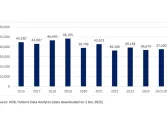Vacant offices in Asia prompt investors to diversify
Investors shift strategies in response to rising vacancies.
Investors are seeking more stable revenue streams and longer-term capital gains in Asia markets as office spaces in Bangkok, Beijing, Jakarta and Shanghai overflow.
CK Lau, Managing Director for Valuation & Advisory Services at Colliers Asia, said that the core issue involves both an oversupply on the market’s supply side and a changing demand landscape.
He said that during the pandemic, numerous office projects were delayed, but with those now completed, they add significantly to the pre-existing stock. This timing has coincided with a period of economic slowdown, leading many companies to reassess their space needs.
According to Lau, "On the demand side, with the expectation of slower economic growth, companies are more cautious these days regarding their long-term business commitments, including expansions of office space and staff hiring." This caution has been evident as companies increasingly prioritise reconfiguring existing spaces over expanding or relocating.
Moreover, the rise of hybrid work models, which blend remote and in-office work, has further diminished the demand for traditional office spaces. This shift is having a marked impact, particularly in regions with a significant stock of office real estate.
When questioned about the timeline for the absorption of this surplus office space, Lau highlighted the variability across different markets. "Each market will perform differently. For instance, Tokyo has seen a shift towards newer office buildings with modern amenities, indicating robust demand there," he noted.
Contrastingly, areas like Bangkok are experiencing an influx of office space, expected to take around two years to reach equilibrium between demand and supply.
Amid these conditions, investors are adjusting their strategies. "There has been a shift towards prioritising sustainable rental income over capital market gains," Lau stated. This strategy focuses on long-term stability and generating steady cash flow from rental incomes, which is increasingly important in uncertain economic times.
Furthermore, environmental, social, and governance (ESG) factors are becoming critical in investment decisions. "Investors are also considering the impact of ESG factors and their implications on property values," added Lau.



















 Advertise
Advertise




